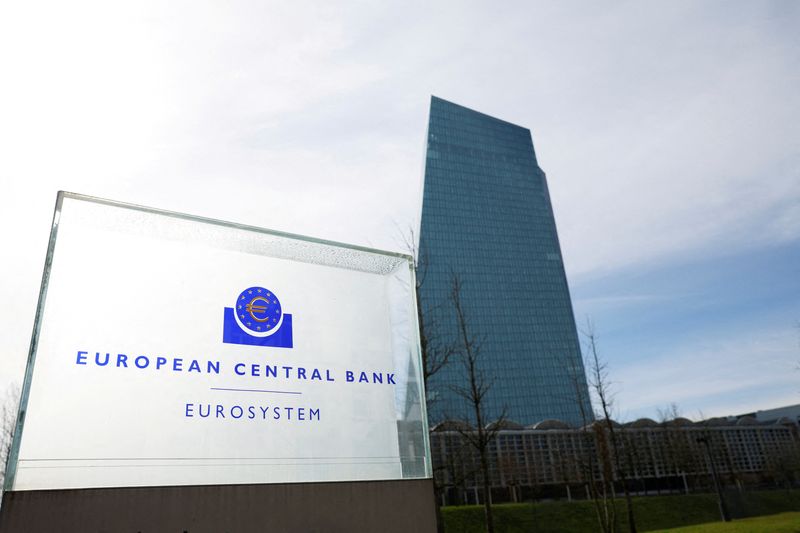Euro zone lenders and borrowers shun credit as rates climb – ECB
2023.10.24 08:43

© Reuters. FILE PHOTO: A view shows the logo of the European Central Bank (ECB) outside its headquarters in Frankfurt, Germany March 16, 2023. REUTERS/Heiko Becker/File Photo
FRANKFURT (Reuters) – Euro zone banks further curbed access to credit in the third quarter even as demand from households and companies fell more than expected amid high borrowing costs and a deteriorating economic outlook, a European Central Bank survey showed on Tuesday.
The ECB’s quarterly Bank Lending Survey showed the bank’s steady diet of interest-rate hikes, aimed at lowering inflation in the euro area, was exacting an even heavier toll on credit creation than banks had anticipated, reinforcing the case for a pause by the central bank.
Banks tightened their standards for granting a loan to companies and households in the three months to September, citing pessimism about the economy but also lower liquidity as a result of the ECB’s policy tightening.
The proportion of lenders making their credit-approval criteria tougher was higher than they themselves had predicted three months earlier, particularly for mortgages and consumer loans.
“For the fourth quarter of 2023, euro area banks expect a further, albeit more moderate, net tightening of credit standards on loans to firms, and broadly unchanged credit standards on loans to households for house purchase,” the ECB said.
“For consumer credit, euro area banks expect a further significant net tightening.”
Demand for loans also fell for all categories of credit in the third quarter.
“Similar to recent quarters, the decline in net demand was significantly stronger than banks had expected, driven mainly by higher interest rates as well as lower fixed investment for firms and lower consumer confidence and deteriorating housing market prospects for households,” the ECB said.
Banks expect a further, albeit less pronounced, decline in demand for all types of loans in the fourth quarter.
The poll also showed banks found it harder to secure funding in the third quarter, especially from retail customers, reflecting stronger competition for deposits.
The ECB is expected to stay put at its upcoming policy meeting on Thursday after raising the rate it pays on banks’ own deposits from -0.5% to 4.0% in just over a year.
This has initially proven a boon for banks, many of which have reported a jump in profits, but it was now restricting credit creation, particularly in sensitive sectors such as real estate.








